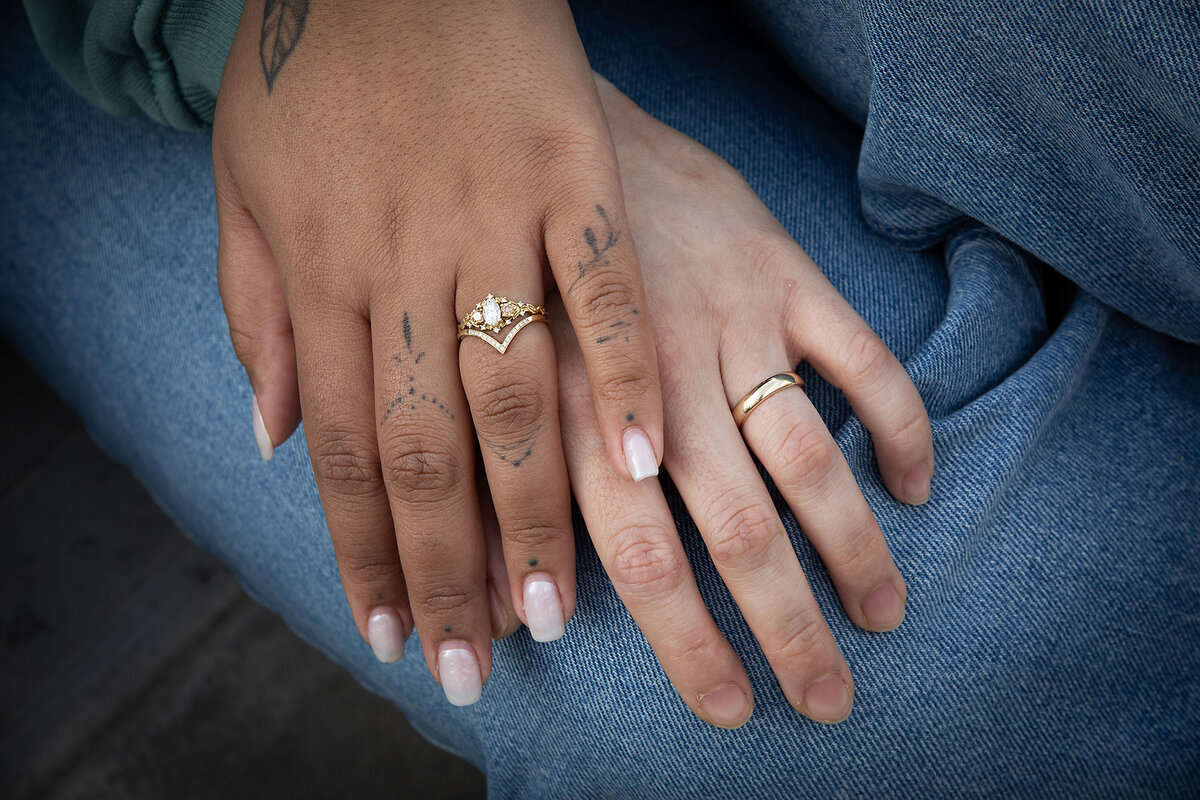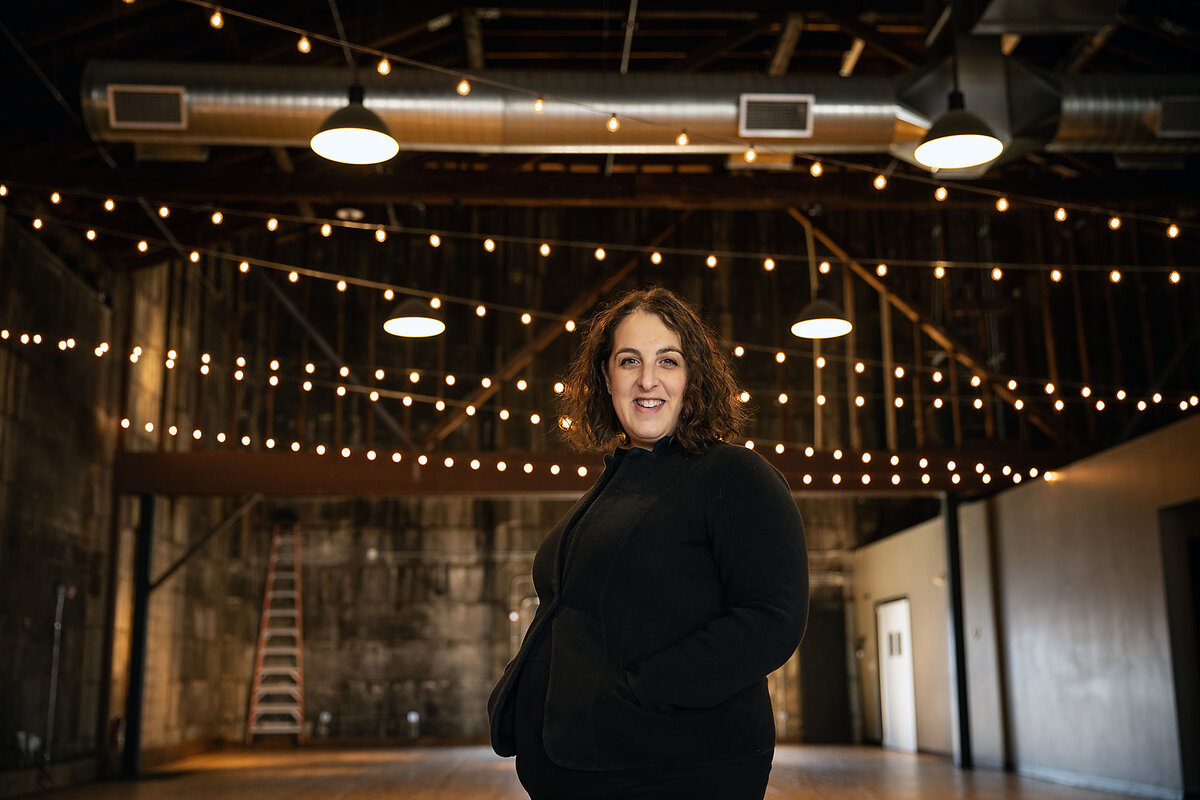10 years ago, SCOTUS said same-sex couples could marry. Why do they worry today?
Loading...
| Boston; and Cumberland and Cranston, R.I.
Like many brides, Yara Damascena was nervous on her wedding day.
Excited, but nervous. She’d never been one to search for the spotlight or vie to be the center of attention. But when she saw her wife-to-be, Iliana, everything else – the people, the camera, the nerves – fell away.
“I just looked at her,” Yara says, describing the moment she walked down the aisle. “I didn’t even see anyone there, to be honest. It felt like it was just me and her.”
Why We Wrote This
A story focused onObergefell v. Hodges, the landmark Supreme Court case that found a constitutional right to same-sex marriage, turns 10 in June. More than two-thirds of Americans consistently support marriage equality. But one attorney who argued the case likens the right to a “split screen” in the Trump era.
The Damascenas say they love each other deeply. Yet their decision to marry came from more than devotion. They worried that they might lose their right to wed under the Trump administration.
Other same-sex couples are making similar decisions to legalize their partnership based on what they describe as a ticking clock.
Obergefell v. Hodges, the landmark Supreme Court case that found a constitutional right to same-sex marriage, turns 10 years old in June. As the anniversary approaches, the rights of LGBTQ+ couples feel bifurcated. Same-sex marriage enjoys broad support among Americans, and simultaneously feels like it could be on shaky ground.
Mary Bonauto, an attorney who argued the Obergefell case, likens monitoring the legal status of same-sex marriage to watching a “split screen.” On one hand, marriage equality is shielded by a long list of courts upholding the right to marry. On the other hand, “Norms that we’ve counted on about how our society operates, and values, are absolutely in question,” under President Donald Trump, she says.
President Trump has not suggested that he supports a bid to overturn the ruling. But this year, Republicans in at least six states have introduced measures urging the Supreme Court to revisit Obergefell. The resolutions are symbolic, but send a clear signal, both supporters and detractors say.
“It’s a powerful statement for legislators to say, ‘This was a flawed decision,’ even if that statement has no legal standing,” Brian Camenker, founder of MassResistance, which has worked to help GOP lawmakers draft the resolutions, told The Salt Lake Tribune.
Since 2017, more than 2 in 3 Americans have consistently supported the right of LGBTQ+ couples to wed, according to Gallup. That number was a little over 1 in 4 when Gallup first asked the question in 1996. The change in support has been one of the biggest cultural shifts in the United States in the 21st century.
But same-sex couples point to the conservative Supreme Court supermajority engineered by President Trump, as well as his return to the White House, as sources of concern for their rights. And at least one Supreme Court justice has written of his desire to revisit Obergefell.
When the Supreme Court overturned Roe v. Wade in 2022, Justice Clarence Thomas specifically singled out Obergefell in his concurring opinion. “In future cases, we should reconsider all of this Court’s substantive due process precedents,” Justice Thomas wrote, naming not only Obergefell but also decisions establishing that same-sex couples have a right to privacy in the bedroom and that married couples have a right to purchase birth control.
While Idaho’s House has passed its Obergefell resolution, North Dakota’s Senate blocked one there after its House passed it, and Michigan’s House speaker declared its version dead in committee. Lawmakers in three other states this year have proposed bills creating a “covenant” marriage option, defined as between a man and a woman. Arizona, Louisiana, and Arkansas already have covenant marriages, which also make divorce more difficult.
Meanwhile, same-sex couples are not waiting.
Mass elopements and moved-up weddings
Loretta Jay, a managing member of the Justice of the Peace Association (JPus), an organization serving six states, says her officiants saw a rush of couples looking to get married before President Trump’s inauguration on Jan. 20. In a JPus survey of public officiants, mostly in New England, 31% in early spring reported seeing an increase in the number of same-sex couples seeking to marry. Some 56% of respondents said their LGBTQ+ clients cited the political or social climate as a reason for getting married. Officiants reported that some clients moved up wedding plans that were months away because they worried they might lose their right to marry.
Charis Books & More, a feminist bookstore and nonprofit in Decatur, Georgia, hosted a mass elopement event for LGBTQ+ couples just before Inauguration Day. E.R. Anderson, executive director of its nonprofit arm, says the idea grew out of a desire to help LGBTQ+ people in his community who were afraid.
“What is a way that we could show care to our community, and do something proactive and fun, that sort of takes the focus off of just doomscrolling?” Mr. Anderson says he asked himself. Similar events in at least four other states – Illinois, Massachusetts, Minnesota, and New York – have underscored the feeling of urgency among LGBTQ+ people, as well as communities’ willingness to come together and help.
As they rush to build a life together, the Damascenas have leaned heavily on each other – and on a community that was more than ready to lend a hand. They eloped at Olio, a wedding venue in Peabody, Massachusetts, and one of over 100 wedding vendors in New England lining up to help LGBTQ+ couples marry in the Trump era. Many are offering services for cost, or, in the case of Olio, allowing couples to use their venue for free.
“It feels like we’re not alone, like there’s people here to help,” Yara says. When Sarah Narcus, Olio’s owner, sent her a list of other vendors offering their services to LGBTQ+ couples, the extent of their generosity moved Yara to tears. It “brought a little light into all of this darkness.”
Why Obergefell is different from Roe
“We are preparing every day for the possibility that someone might try to shake things up,” says Ms. Bonauto, an attorney at GLBTQ Legal Advocates & Defenders. “I understand why people are concerned.”
Yet Obergefell is “legally distinguishable from Roe versus Wade” in part because of the equal protection clause of the 14th Amendment, says Brad Sears, an attorney who studies LGBTQ+ policy at the Williams Institute at the University of California, Los Angeles. That bedrock part of the Constitution, which prohibits denying anyone “equal protection of the laws,” didn’t much factor into the court’s decision overturning Roe. But it would pose a major obstacle to anyone seeking to challenge Obergefell, according to Mr. Sears.
Marriage’s importance to governance is another protectant. Marriage plays a critical role in matters such as taxation, insurance, medical care, and parental rights. Courts may be loath to undermine a legal institution around which so many people plan their lives, Ms. Bonauto says.
Plus, repealing Obergefell would not end marriage equality nationwide. The Respect for Marriage Act, which Congress passed in a bipartisan vote in 2022 and was signed into law by President Joe Biden, requires states and the federal government to recognize marriages as valid so long as they were legal where they were performed. Still, a 2022 analysis by Poynter found that more than 25 states have laws outlawing same-sex marriage that would go into effect if Obergefell were overturned. Virginia and Oregon are two states looking to amend their laws to protect same-sex marriage.
Same-sex marriage rights have, however, lost to religious liberties in court in the decade since Obergefell became law. Two U.S. Supreme Court cases – 303 Creative LLC v. Elenis, and Masterpiece Cakeshop v. Colorado Civil Rights Commission – both said business owners can refuse to serve same-sex couples if doing so conflicts with their sincerely held religious beliefs.
“What does it mean to support the community?”
The Damascenas met a little over a year ago, at a mutual friend’s baby shower. It didn’t take long for them to fall for each other.
They’ve drawn on a well of love and trust to keep them afloat in a political climate that, in their view, is hostile. “We’re Latina; we are women; we’re gay,” Iliana says. “All the things that [Mr. Trump’s] against, it’s just who we are.”
So when they learned that he would again be president, they acted quickly. They rushed through wedding planning that typically would take place over months, skipping traditions such as engagement parties and bridal showers.
The Damascenas express a sense of gratitude to Ms. Narcus, the wedding venue owner. They say she helped make even a rushed ceremony feel special. Between November 2024 and January 2025, Olio hosted 14 free elopements for LGBTQ+ couples. Ms. Narcus, for her part, says serving all members of her community – regardless of their background – is the heart of her business.
“You have to really be out in front of it talking about, ‘What does it mean to support the community?’” she says. “You have to say it, and you have to show it.”
There are things that the Damascenas wish they could have experienced. Yara says she wishes she had fulfilled her lifelong dream of going wedding dress shopping with her mother, who lives in Brazil. Iliana wishes she could have invited more of their friends and family. They both say their dream wedding would have looked different.
But for now, the one-hour ceremony on a snowy day in February, attended by their closest friends and family, is enough. Today, the Damascenas are more focused on the future. They’ve recently bought a house and are eager to start a family. They’re considering planning a larger wedding ceremony in Brazil, so that more of Yara’s family can attend.
“Regardless of how it happened, all this stress, at the end of the day we’re super happy,” Iliana says. Yara tears up at her wife’s words. “It doesn’t change the outcome. I married my favorite person in the world.”
Editor’s note: This article, originally published May 8, has been updated to include the full name of JPus – the Justice of the Peace Association.








